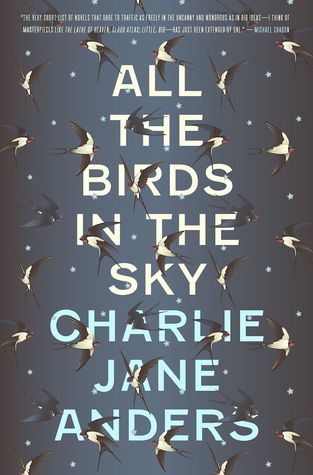All the Birds in the Sky
Is a tree red? Is a tree red? Is? A tree? Red?
Delight is my crunchy granola-type friend with an Environmental Sciences degree who, although never having worked in her field, runs several Facebook groups about environmental issues. Whenever she finds and posts an article about a technological breakthrough, Delight will tag me ironically, saying, “Maybe Krista's right and the Star Trek universe will arrive in time to save us all.” This elicits smirky emoticons from her other crunchy granola-type friends, but I usually reply with a hopeful, “Maybe it will!” All the Birds in the Sky rather perfectly captures this dichotomy of philosophy through its two main characters, and with an intriguing blend of Fantasy and Sci Fi, explores the ethical consequences of where scientific progress has led the planet. This book is a fun romp, even if it totally reads YA, and while in the end it didn't exactly feel deep or 100% logical, it was interesting and compelling. Slight spoilers beyond.
“Your friend would control nature," said the Tree, rustling through each syllable one by one. "A witch must serve nature.”
All the Birds in the Sky begins in the childhood of our main characters: Patricia is a “wild, grubby girl” who learns early that she has an ability to talk with animals, who promptly tell her that she must be a witch. Although she doesn't have any real powers – even the talking with animals comes and goes – Patricia is marked as different and is treated as an outcast at school. Laurence is “a small kid for his age” with “arms like snail necks”, and while the kids at school bully and torment him, he's a techno genius who builds a Two Second Time Machine from obscure online directions and is assembling a Supercomputer in his closet. These two come together as wary allies – neither quite understanding the other but accepting friendship where they can get it – and when the story skips ahead to junior high, the pressures of puberty drive an uncomfortable wedge between them. They both have cartoonishly bad parents to deal with – Patricia's are high achievers who look for any reason to punish their oddball daughter (locking her in her room and “decapitating” her meals as they're slid beneath her door) while Laurence's are underachievers who are so desperate to blend in that they'll end up banishing their son to a sadistic Military School at the first suggestion of notoriety – and in a spoofy (but actually quite funny) subplot, an assassin who has seen the future tries to track down the pair and ends up as their Guidance Counselor.
It's always too soon until it's too late.
The narrative skips ahead again, and the pair reunites after a decade or so apart. Patricia is now a trained witch living and doing benevolent magic in a hipster San Francisco neighbourhood, and Laurence is a tech wunderkind working for an Elon Musk-type character. And this is where the dichotomy of thought (and my biggest spoiler) really comes into play: In response to worsening global superstorms, war, famine, and drought, Laurence's group is attempting to build an antigravity machine that will be able to transport at least ten per cent of the human population to another suitable planet (even though there is the smallest risk of destroying Earth in the process), and Patricia's group is deciding whether or not to implement the Unraveling (a form of chaos that would decimate the human population for several generations and give the Earth a chance to recover). Despite a budding romance between the pair, Patricia and Laurence keep their professional secrets from one another, and when their groups collide, the climax is exciting and cinematic.
Self-awareness paradoxically requires an awareness of the other.
Like I said, this book reads like YA – spanning, as it does, the years between Dumpster swirlies and online dating – and there's a hipster preciousness to the frequent mention of vegan donut shops and Korean food trucks. The very ending **spoiler** That there's hope for the future once the techno AI device melds with the ancient wisdom of the Tree – ushering in a future where “a cyborg will be the same thing as a wizard” – and that this mirrors the romantic melding between Patrica and Laurence /**spoiler** wasn't the perfect payoff for me, but I have to admit that I was entertained throughout. I certainly liked author Charlie Jane Anders' sense of humour:
“We’re doing serious research here,” said Tanaa. “Nothing is a toy. Well, except for Six-Fingered Steve.” She gestured at the tiny tap-dancing robot, who heard his name and made jazz hands with too many digits. Disturbing, as always.
I read All the Birds in the Sky quickly because it was so entertaining, and I appreciate that it explores this modern day dichotomy of philosophy that I seem to confront daily (I know which side Delight would fall out on in this confrontation; she might be surprised to see me join her there), so it feels like it would be miserly of me to withhold too many stars on this one. Ultimately, the four stars reflects this book's ranking against other books of its type.

